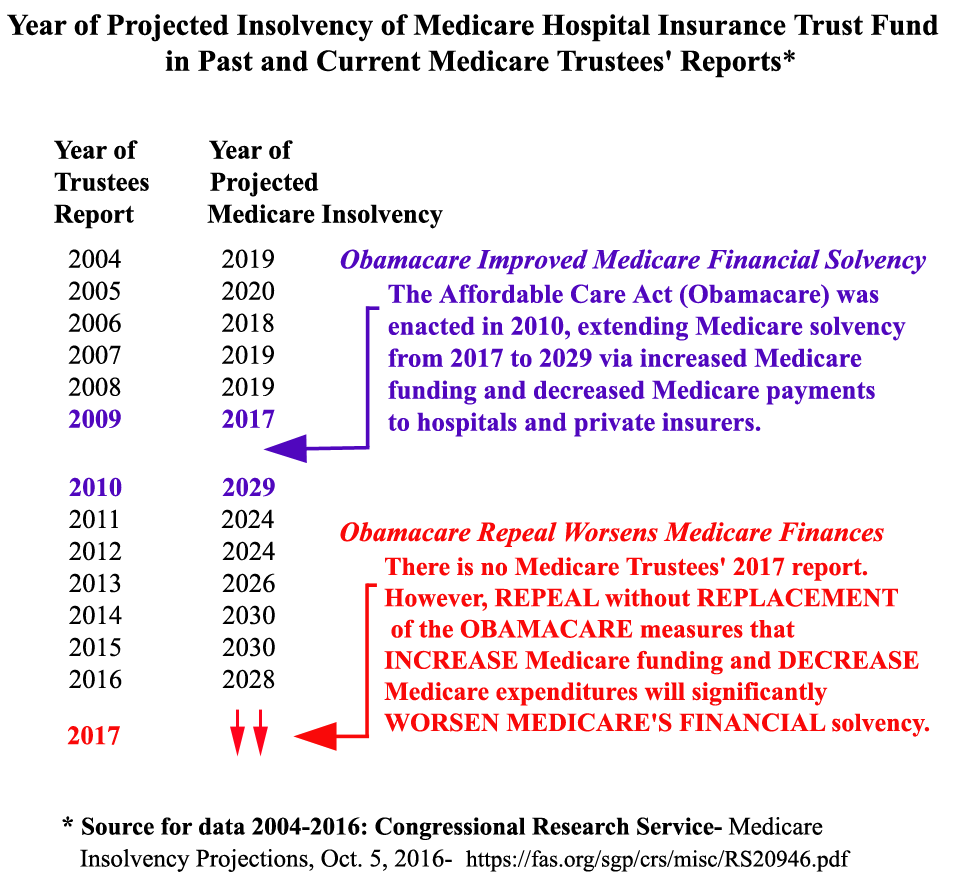
Repealing Obamacare Financially Weakens Medicare
E.Roehm, M.D. 2017
Medicare Check List
for Grading Obamacare
Replacement Legislation
Medicare finances have substantially improved with the measures in the Affordable Care Act (Obamacare). The Affordable Care Act contained Medicare legislation that increased Medicare funding and decreased Medicare’s costs. Medicare financial solvency has been extended from 2017 to 2028 with the passage of Obamacare, an 11 year increase. If Obamacare is repealed without replacing the measures in Obamacare that help Medicare’s finances, Medicare’s financial solvency will substantially decrease.
Despite efforts by some to characterize the improvements in Medicare’s finances with Obamacare as illusory, whenever an entity’s funding increases and outgoing payments decrease, finances are improved.
How the Affordable Care Act (Obamacare) Improves Medicare Financial Stability
The Affordable Care Act (Obamacare) increases the amount of money going into the Medicare Hospital Trust Fund. The Affordable Care Act creates a 0.9% annual Medicare tax on individual incomes greater than $200,000 that goes directly into the Medicare Hospital Trust Fund. The many additional billions of dollars that go into the Medicare Hospital Trust Fund help pay for the hospital care of all Medicare patients.
The Affordable Care Act (Obamacare) has legislation that decreases the rate of growth in payments to hospitals and medical care providers. This has saved Medicare hundreds of billions of dollars since 2010 when Obamacare was passed and continues to save billions of dollars every year.
The Affordable Health Care Act also reduces the overpayment made to private insurers administering Medicare Advantage plans. Private insurers previously were paid 14% more per patient than the cost of a similar patient in traditional Medicare. Now, because of legislation in the Affordable Care Act, private insurers of these plans receive approximately 2% in excess payments rather than 14% when compared to a similar patient cared for in traditional Medicare. This has also saved Medicare over a hundred billion dollars and continues to save billions of dollars.
Does Medicare Really Go Bankrupt?
The date that Medicare is described as becoming financially insolvent does not mean Medicare goes bankrupt or that there are no funds available to pay for benefits. Medicare insolvency means there are no longer sufficient funds to meet 100% of the Medicare Trust Fund obligations. Revenue will continue to flow into the Hospital Trust Fund Over the 50 year history of Medicare, Medicare financial solvency projections have ranged from 2 to 30 years. Medicare’s financial solvency has been extended a number of times primarily due to legislative changes that had the effect of restraining growth in program spending.
Direct Effects of Obamacare on Medicare Beneficiaries
The overall effects of Obamacare on Medicare beneficiaries have been positive. There has been a reduction in the size of the prescription “donut hole” and better coverage for preventive visits for Medicare beneficiaries. (The prescription donut hole is scheduled for elimination by 2020 by statutes within the Affordable Care Act.) The reduction in the over 100 billion dollars of excessive payments previously made to the Medicare Advantage programs has made the Medicare program more financially secure for all participants.
www.NutritionHeart.com/Medicare-at-Risk

